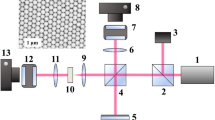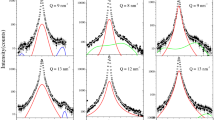Abstract
ZINC and cadmium belong to sub-group II of the Periodic System. Their compounds exhibit properties characteristic of the second group. Deviations from the normal thermodynamic behaviour have been reported in the case of halides of these metals1. Investigation by ultrasonic radiation2,3 of aqueous solutions of cadmium halides showed interesting deviations from the normal behaviour of electrolytic solutions. Hence, it is expected that zinc halides would also exhibit similar anomalies.
This is a preview of subscription content, access via your institution
Access options
Subscribe to this journal
Receive 51 print issues and online access
$199.00 per year
only $3.90 per issue
Buy this article
- Purchase on Springer Link
- Instant access to full article PDF
Prices may be subject to local taxes which are calculated during checkout
Similar content being viewed by others
References
Harned, H. S., and Owen, B. B., “The Physical Chemistry of Electrolytic Solutions”, Chapter 13 (1950).
Balachandran, C. G., J. Indian Inst. Sci., 37, 27 (1955).
Subrahmanyam, S. V., Trans. Farad. Soc., 56, 971 (1960).
Author information
Authors and Affiliations
Rights and permissions
About this article
Cite this article
SUBRAHMANYAM, S. Velocity of Ultrasonic Waves in Aqueous Solutions of Zinc Halides. Nature 188, 570–571 (1960). https://doi.org/10.1038/188570a0
Issue Date:
DOI: https://doi.org/10.1038/188570a0
Comments
By submitting a comment you agree to abide by our Terms and Community Guidelines. If you find something abusive or that does not comply with our terms or guidelines please flag it as inappropriate.



